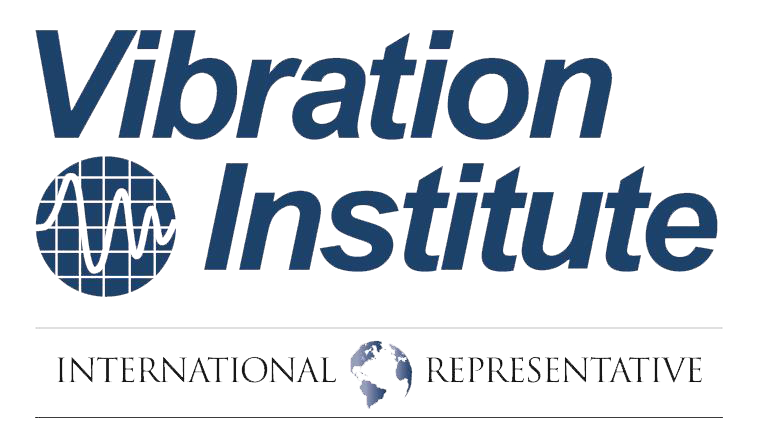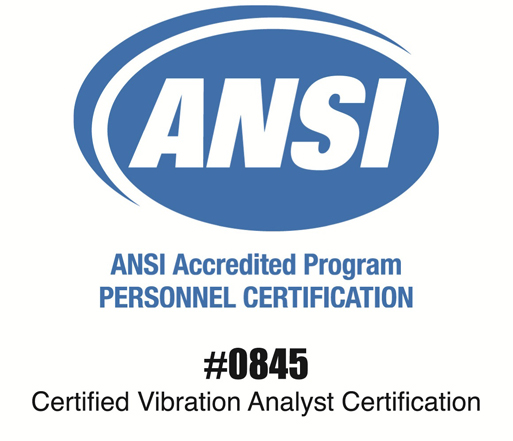- Home
- Vibration Institute | ISO-18436 Vibration Analysis Training and Certification
- Practical experience on vibration measurement and basic time and spectral analysis.
- Field measurement of amplitude, frequency and phase
- Calibration of measurements
- Data analysis and interpretation
- The basic rotordynamic theory
- Modeling and analysis of rotors
- Critical Speeds and Mode Shapes
- The Transfer Matrix Method
- Development of a dynamic model
- Modeling machinery components
- Run-up and coast-down tests
- Static and Couple balancing
- Effect of bearings on dynamic behavior of rotors
- Stability of rotating machinery
- Bodé and Nyquist Plots
- Introduction to rotor balancing
- Field balancing
- Fluid film bearing modeling and analysis
- Modal behavior of rotors
- Balancing instrumentation
- Multi-plane balancing
- Flexible rotor balancing
- Structural vibration measurement
- Faults in machinery
- Generated forces in machinery
- Resonance
- Critical speed testing
- Bump tests
- Measurement of operating deflection shapes (ODS)
- Modal testing ofmachines and structures
- Applications and case histories from industry.
- Vibration measurement
- Selection and installation of sensors
- Setting-up of data collector
- Analyzer set-up
- Measurement of time waveform
- Measurement of spectra
- Measurement of amplitude and phase
- Identification of Faults including: unbalance, misalignment, bearing faults, …etc
- Balancing of machinery using RIMAP
As the sole representative of the Vibration Institute in the Middle East, RITEC provides Vibration Institute: ISO-18436 Vibration Analysis Training and Certification.
The Vibration Institute’s training program follows ISO 18436 – Part 1, 2 & 3 and certification program is accredited by the American National Standards Institute (ANSI) in conformance with ISO/IEC 17024-2012 and certifies Vibration Analysts Category – I, II, III & IV according to ISO 18436 - Part 2.
To enquire on Location/Dates of upcoming Vibration Institute Courses, Please email us at: training@ritec-eg.com.

2020 Courses Schedule
Basic Machinery Vibration (BMV)ISO CAT II
Cairo, Egypt
March 8th - 14th 2020 Machinery Vibration Analysis (MVA)
ISO CAT III
Al-Khobar, KSA
March 14th - 19th 2020 Introduction to Machinery Vibrations (IMV)
ISO CAT I
Dubai, UAE
March 23th - 29th 2020 Basic Machinery Vibration (BMV)
ISO CAT II
Cairo, Egypt
March 29th - April 4th 2020 Rotordynamics and Balancing (RDB)
ISO CAT IV
Cairo, Egypt
April 5th - 9th 2020 Basic Machinery Vibration (BMV)
ISO CAT II
Al-Khobar, KSA
April 11th - 16th 2020 Machinery Vibration Analysis (MVA)
ISO CAT III
Cairo, Egypt
June 7th - 13th 2020 Basic Machinery Vibration (BMV)
ISO CAT II
Dubai, UAE
June 14th - 21th 2020 Basic Machinery Vibration (BMV)
ISO CAT II
Cairo, Egypt
July 12th - 18th 2020 Machinery Vibration Analysis (MVA)
ISO CAT III
Dubai, UAE
September 6th - 13th 2020 Introduction to Machinery Vibration (IMV)
ISO CAT I
Al-Khobar, KSA
September 13th - 17th 2020 Structural and Machinery Vibration
ISO CAT IV
Cairo, Egypt
September 20th - 24th 2020 Basic Machinery Vibration (BMV)
ISO CAT II
Al-Khobar, KSA
November 21st - 26th 2020 Practical Machinery Vibration
ISO CAT II
Cairo, Egypt
December 6th - 12th 2020 » » Click Here to View 2020 Egypt Course Schedule » » Click Here to View 2020 KSA Course Schedule » » Click Here to View 2020 UAE Course Schedule
ISO-18436 Vibration Training & Certification
Certification Program:
As is generally known, all specialized trades that can affect a company’s safety and performance are Certified, e.g. welders and inspectors.Recently, there has been a worldwide trend towards Certifying Vibration Specialists. This move started in the United States, and was pioneered by several Chemical Processing and Oil Companies requesting the certification of their Vibration Specialists to assure their competence in the field, with expected rewards to the company performance and safety record.
The Vibration Institute has established a world-wide Certification program in accordance with ISO 18346 where four categories of Vibration Analysts are currently recognized:
Vibration Analyst – Category I
Vibration Analyst – Category II
Vibration Analyst – Category III
Vibration Analyst – Category IV
View Certification Requirements Here.
RITEC is pleased to announce that the Vibration Institute Certification exams are conducted regularly in: Cairo, KSA, & UAE area each year.
• The exams are prepared and corrected at the Vibration Institute, USA.
• All Analyst Certificates are issued from the Vibration Institute.
In-House Training
RITEC is pleased to offer any of its training courses as in-house courses for requesting customers. We offer a blend of our standard courses, as well as customized training programs in Condition Monitoring and Machinery Vibration Analysis, to fit our customer's needs.All in-house courses are to be held at Customer site for about 15 engineers or technicians. It is understood that Customer shall provide transportation (Business Class travel) to and from site, and accommodation on-site for instructors.
All our courses are offered as Vibration Institute courses. The course certificates are issued from the Vibration Institute, the training materials are all from the Vibration Institute, and even the course transparencies are mostly from the Vibration Institute. This assures the quality of the course as conforming to the international level of training. In addition, the course instructors are Certified Vibration Specialists, which ensures practical knowledge of the art and science of vibration analysis.
The courses will be taught by a group of instructors led by Dr. Aly El-Shafei, Professor at Cairo University and General Manager of RITEC. In addition to being Professor at Cairo University, Dr. Aly El-Shafei is also a consultant to industry, and has cooperated with such companies as General Electric (USA), Assix International (USA), Mannesmann Demag (Germany), MTU (Germany), SUCO, BAPETCO and AOI (Egypt). In addition, Dr. El-Shafei is involved in several local and international research projects. He has published many technical papers in the vibration field, and holds two patents to his name. Dr. El-Shafei holds a Ph.D. from the Massachusetts Institute of Technology. He is a member of ASME, Tau Beta Pi, and Sigma Xi, and is a Certified Vibration Analyst - Category IV.
Vibration Training Courses
The following is a description of each of the courses offered by RITEC:
Introduction to Machinery Vibration (IMV) CAT I
Duration: 3 daysFor: All maintenance engineers and technicians
This course is designed for Technicians and Engineers with limited experience in Vibration measurement and analysis. It is designed to provide the attendees with:
Basic Machinery Vibration (BMV) CAT II
Duration: 4 days
For: All maintenance engineers and technicians
Basic Machinery Vibration is designed as an introductory course to the use and analysis of machinery vibration data for condition monitoring.
The course emphasizes the effects of vibration on mechanical equipment, the instrumentation used to measure vibration, the techniques used for vibration analysis and control, developing a condition monitoring program, and vibration correction and criteria. Examples and case histories of Industrial vibration problems are used to illustrate techniques.
Participants have the opportunity to become familiar with these techniques during workshops. This course will be of interest to engineers and technicians who must identify and correct faults in machinery; and should be sufficient in addition to field experience, to prepare the attendees for the Vibration Analyst - Category II Certification Exam.
Machinery Vibration Analysis (MVA) CAT III
Duration: 4 daysFor: All maintenance and vibration engineers and technicians
The most widely accepted measure of machine condition is its vibration signature. This course is designed to expose the techniques of vibration analysis of machinery, with the aim of improving machinery monitoring and diagnosis.
This course is a more advanced course with emphasis on diagnostics techniques. Not only spectrum analysis, but also time domain, phase analysis and demodulation techniques are discussed. The emphasis is on techniques to verify the existence and the extent of faults and means to evaluate the condition of a machine. Bearing Faults, Gear Box Faults, Electric Motor Vibrations, and Rotating Machinery Malfunction, Balancing, Isolation and Correction represent the main thrust of this course.
The course provides a unique format in which an abundance of case studies are presented as application of machine condition analysis. The course prepares attendees for Category III certification according to ISO 18436.
Balancing and Alignment
Duration: 4 daysFor: All maintenance and vibration engineers
This course is intended to provide basics of both alignment and balancing of rotating machinery and field applications. The course presents the vibration analysis leading to the identification of balancing and alignment of rotating machines.
For balancing, the course presents: Field balancing techniques including single plane balancing, two-plane balancing and static-couple balancing. Workshop applications will be provided.
For alignment the course presents various alignment methods including: rough alignment, face and rim alignment, reverse indicator method (graphical & analytical), and laser alignment techniques.
Practical application are provided including considerations of preparation of alignment, brackets and coupling, thermal considerations and alignment tolerances. Workshop applications are provided.
Rotordynamics and Balancing (RDB) CAT IV
Rotordynamics describes the science and practice of analyzing the dynamics of rotating machinery. All rotating machinery, particularly high speed-high performance machinery, inherently exhibit unique dynamical behavior that can affect the operation and maintenance of the machine.This course describes the fundamentals of the dynamics of rotors and the analysis and correction of rotating machinery problems. Topics include:
Structural Vibration Analysis
Duration: 4 daysFor: All maintenance and vibration engineers
This course is intended to stress the relationship between structural and machinery vibration. Topics covered include:
Practical Machinery Vibration
Duration: 4 daysFor: All maintenance and vibration engineers and technicians.
This course is intended as an extended workshop to provide practical training on machinery vibration. Continuous workshops on:
